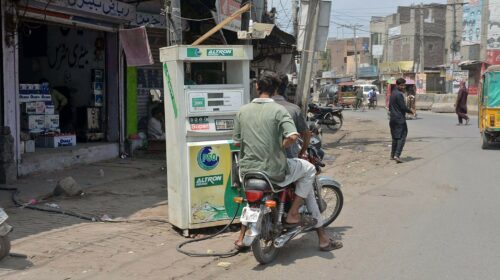Several fuel pumps are operating across the country without licences or due authorization or selling petroleum products other than what they were allowed.
These fuel stations are also involved in the hoarding of petroleum products.
This was disclosed in the audit reports for accounts of the Petroleum Division and the Oil and Gas Regulatory Authority (Ogra) for the fiscal year 2021-22.
The report, a copy of which is available with SAMAA TV showed that illegal and unauthorized fuel pumps are involved in selling unrefined fuel, which has been smuggled from places such as Iran.
Expired licences
The report said that OGRA is bound to ensure that oil marketing companies (OMCs) are not involved in giving their products to fuel pumps operated by other OMCs.
For this purpose, a proper tracking system was set up to point out where a tanker decanted and that a heavy fine would have to be paid in case of violating the decanting regulations.
The auditor general in the report raised questions over the mechanism that ensures standards of fuel transporting/supplying tankers and the performance of Ogra’s monitoring and enforcement department.
During the audit of OGRA for the FY 2020-21, it was discovered that the lease of some 206 petroleum outlets/fuel pumps of certain OMCs had expired.
However, these facilities continued to sell petroleum products.
“Either the OMCs were providing petroleum products to illegal outlets or the outlets were selling smuggled products,” the audit report observed.
Moreover, the audit report noted that Ogra failed to initiate any punitive action against these outlets, nor did it take up the matter with the relevant district authorities to close these fuel pumps.
When the matter was reported to Ogra in January 2022, the authority retorted that the auditor general had no jurisdiction to review these matters.
The auditory general found this stance of the authority contrary to constitutional provisions. Accordingly, the matter was taken up with the Cabinet Division by the Auditor General of Pakistan. The Cabinet Division, in turn, took up the matter with the federal cabinet and a committee was constituted under the Federal Finance Minister for further action.
But the outcome of the committee is still awaited.
Illegal operations
The audit found that at least 125 retail outlets with due licencing and franchise agreements were operating without purchasing any volume or sufficient volume of products from the companies.
Moreover, OCRA and OCAC found 217 to 300 illegal retail outlets operating without valid licences or permission from respective district authorities.
The inaction of oil marketing companies against these retail outlets or outlets operating without licences resulted in the illegal growth of retail outlets.
Moreover, the report said that this encouraged the hoarding of local products and the sale of smuggled petroleum products.
The issue was reported to Pakistan State Oil (PSO) management in October 2021. In reply, PSO said that whenever it closes a retail outlet or fuel pump, it removes all of its assets. At the same time, it also informs the relevant district administration and explosives department for their processes.
However, PSO conceded that illegal retail outlets and fuel pumps continue illegally use logos of theirs and other OMCs.
“Time and again, PSO has taken up the matter with the concerned authorities to take necessary action against such illegal retail outlets,” PSO stated.
The auditors, however, found a discrepancy in the number of non-active retail outlets of PSO, given that a list of operational retail outlets provided by PSO contained 3,114 outlets. In comparison, the Department of Energy has a record of 3,239 retail outlets licenced by PSO, while in its annual report, PSO claimed to have 3,500 retail outlets.
A later record of sales to retail outlets from bulk oil supply depots submitted to Ogra showed that PSO was supplying petroleum products to some 3,456 retail outlets.
Of these, it was found that some 225 fuel pumps took minimal supplies – one to 10 times ranging from 5,000 liters to 192,000 liters during an entire financial year.
The auditors concluded that there were some 230 to 300 non-active retail outlets working without licence from DoE and purchasing petroleum products.
It recommended investigating the matter of retail outlets not taking supplies from PSO and should consider cancelling franchise agreements with these non-active retail outlets and reconciling updated lists of active retail outlets with Ogra.
Non-compliant tankers
The auditors found that during the fiscal year 2020-21, an oil marketing company was transporting petroleum products from Karachi port to 22 depots in the northern parts of the country using some 8,197 registered lorries.
These lorries were secured through 443 registered carriage contractors.
However, auditors found that only 2,663 lorries were compliant with Ogra rules for tankers transporting fuel.
The remaining 5,534 lorries did not comply with Ogra regulations.
The auditors noted that there was no arrangement for monitoring the movement of these trucks, accidents and of actual delivery at listed destinations.
It found that supplies from bulk oil depots and terminals to retail outlets are primarily carried out by non-compliant trucks, which violates the necessary SRO.
“Audit is of the view that this gross violation of Oil Rules, 2016 and non-compliance of technical standards resulted in the dumping of petroleum products,” it said, adding that it made the “physical reporting of actual deliveries and digitization of data of whole oil supply chain difficult.”
When the matter was raised before the relevant authorities, it was stated that the Petroleum Division had allowed Ogra and the National Highway Authority (NHA) non-compliant tank lorries through a 2020 letter till the commencement of multi-product movement through the White Oil Pipeline.







